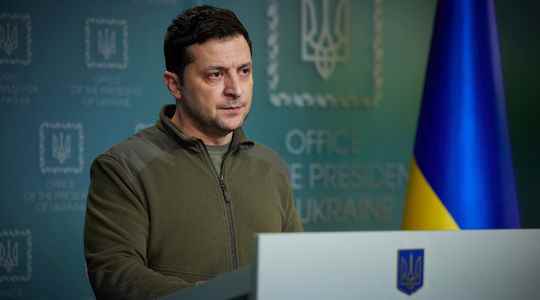With the recognition of Crimea as Russian territory, Vladimir Putin made it an essential condition for the end of the war: that Ukraine become a “neutral state”. At the heart of the talks held over the weeks by the belligerents, the question “is being studied in depth” by kyiv, assured President Volodymyr Zelensky, Sunday, while the Ukrainian and Russian delegations must continue their face-to-face discussions. this week in Turkey.
A “neutrality”, yes, but which one? This way of resolving the conflict foresees above all the renunciation of joining NATO. While the Kremlin is constantly presenting the transatlantic military alliance as an existential threat, Zelensky publicly took a first step in mid-March by declaring that he recognized that his country could not join it.
It remains to find the form of such a concession. Because Ukraine included in its Constitution, three years ago, the objective of eventually joining NATO. “This means finding the right way to remove the problematic sentence, argues Igor Delanoe, deputy director of the Observatory of Russia. However, to renounce NATO on its own, Ukraine will ask for guarantees of security, this is the heart of the difficulty posed by the question of neutrality, because a guarantor must be found, whose mission remains to be defined.
On 17th March last Ukrainian Foreign Minister Dmytro Kouleba presented Turkey as a possible “guarantor”. His Turkish counterpart, Mevlut Cavusoglu, told him that Moscow “saw no objection and could accept such an offer”. And for good reason: Turkey is the most rebellious member of NATO, having bought sophisticated weapons from Russia (S-400 anti-aircraft system) while delivering its TB2 drones to kyiv. And its leader, Recep Tayyip Erdogan, has always been able to maintain a relationship combining power, rivalry and a form of respect with Vladimir Putin.
Zelensky plays the opening
One thing is certain: kyiv does not trust Moscow at all. Volodymyr Zelensky also refuses a treaty which is “another paper in the style of the Budapest memoranda”. This 1994 agreement provided for respect for the territorial integrity of Ukraine against the abandonment of nuclear weapons in its possession since the fall of the USSR. A treaty violated by Russia with the annexation of Crimea and the armed revolt in the Donbass, in 2014, before the invasion launched in February.
This agreement on “neutrality” could be more tactical than anything else in the negotiations. “None of the parties seems willing to accept compromises, Zelensky takes the Russians at their own game by saying that he is ready to negotiate the subjects which interest Russia officially”, points out Marie Dumoulin, director of the Wider Europe program at the European Council on Foreign Relations (ECFR).
In fact, the situation remains uncertain on the military ground. Ukraine has conducted some successful counter-offensives around kyiv, Kharkiv and near Kherson. Can she pursue them? Russia is leading the siege of the strategic port of Mariupol. And she has declared her intention to concentrate her effort on the Donbass, where her army is seeking to take the Ukrainian front line in a pincer movement.
“The Russians believe they still have numerical and technical superiority to continue their operations and conquer territories, notes Marie Dumoulin. If the ceasefire is caused by the exhaustion of Ukrainian forces, neutrality according to Moscow’s terms will be on the agenda. If the conflict freezes, it could also remain in abeyance.” It’s hard to imagine that the new discussion session, this week in Turkey, will give birth to an agreement.
